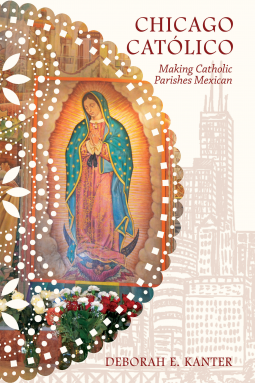
Chicago Católico
Making Catholic Parishes Mexican
by Deborah E. Kanter
This title was previously available on NetGalley and is now archived.
Send NetGalley books directly to your Kindle or Kindle app
1
To read on a Kindle or Kindle app, please add kindle@netgalley.com as an approved email address to receive files in your Amazon account. Click here for step-by-step instructions.
2
Also find your Kindle email address within your Amazon account, and enter it here.
Pub Date Jan 13 2020 | Archive Date Jan 24 2020
Talking about this book? Use #ChicagoCatólico #NetGalley. More hashtag tips!
Description
How churches transformed Mexican communities and an American city
Today, over one hundred Chicago-area Catholic churches offer Spanish language mass to congregants. How did the city's Mexican population, contained in just two parishes prior to 1960, come to reshape dozens of parishes and neighborhoods?
Deborah E. Kanter tells the story of neighborhood change and rebirth in Chicago's Mexican American communities. She unveils a vibrant history of Mexican American and Mexican immigrant relations as remembered by laity and clergy, schoolchildren and their female religious teachers, parish athletes and coaches, European American neighbors, and from the immigrant women who organized as guadalupanas and their husbands who took part in the Holy Name Society. Kanter shows how the newly arrived mixed memories of home into learning the ways of Chicago to create new identities. In an ever evolving city, Mexican immigrants and Mexican Americans’ fierce devotion to their churches transformed neighborhoods such as Pilsen.
The first-ever study of Mexican-descent Catholicism in the city, Chicago Católico illuminates a previously unexplored facet of the urban past and provides present-day lessons for American communities undergoing ethnic integration and succession.
Deborah E. Kanter is John S. Ludington Endowed Professor of History at Albion College. She is the author of Hijos del Pueblo: Gender, Family, and Community in Rural Mexico, 17301850.
Advance Praise
"Chicago Católico is the first book of its kind, a superb history of Mexican parish life in a city of diverse Catholic immigrants. Kanter relates a fascinating tale of faith, identity, and the transformation of a city's largest religious institution."--Timothy Matovina, author of Latino Catholicism: Transformation in America's Largest Church
"Chicago Católico not only describes the faith practices of Mexican immigrants, but also explores the social worlds of Catholicism and the ways in which the Church helped mark neighborhoods, assist immigrants in their transitions to the frigid Midwest, and provide people a sense of home. This book is an important and timely contribution to the growing field of Latino religious history."--Felipe Hinojosa, author of Latino Mennonites: Civil Rights, Faith, and Evangelical Culture
Marketing Plan
-ARC Mailing to Chicago and Catholic Media
-Feature on Netgalley
-Printer’s Row feature
-Email blasts to in-house email lists
-Social Media Campaign
-ARC Mailing to Chicago and Catholic Media
-Feature on Netgalley
-Printer’s Row feature
-Email blasts to in-house email lists
-Social Media Campaign
Available Editions
| EDITION | Other Format |
| ISBN | 9780252084843 |
| PRICE | $24.95 (USD) |
| PAGES | 224 |
Links
Average rating from 1 member
Featured Reviews
Kanter's exploration of Catholicism for Mexican communities in Chicago sheds light on an important topic that has been rarely discussed. It provides an excellent introduction into the Hispanic communities of Chicago and how their religion is met through Mexican churches throughout the city. With real life case studies, Kanter explores a vital topic with decency and empathy for the lives of the women in Chicago. A must read for those aiming to gain a greater understanding of Mexican Catholic communities in the States - particularly in the Eastern states, where Mexican Catholic communities tend to go unnoticed.



